To all who don’t follow SHERLOCK, this was the final episode of Sherlock for the conceivable future, so you are safe from here on out. Rather than simply skipping this post, head over to Called to Watch for some other reading!
Well, this was an unexpected episode in many respects. Lots of reviewers have slammed it as being extremely unrealistic – and you know what? It was. There were several ‘Oh really?’ moments, not to mentions unlikely escapes and rather gaping plot holes.
But I’m not going to discuss that. Because Sherlock has always been relatively unrealistic, it has always required a suspension of disbelief, and yet we’ve swallowed it hook, line and sinker, because we’ve wanted to. It’s been fun. If we look at the original canon, most of the adventures are rather unlikely, and the deductions require luck as well as genius. And we don’t mind too much, because after all, as Sherlock Holmes himself says, truth is often stranger than fiction.
On a thematic level, this episode asks questions such as:
Does anyone ever have the right to make decisions on behalf of another?
Do emotions affect our morality? Is this right?
What I liked
The characters have changed… and so have we
This episode drags the main characters away from their normal surrounds, places them in a ‘closed world’, and in doing so clearly reveals their values and beliefs. And yet, for the first time I found myself asking not whether they would be the characters I wanted them to be, whether they would do ‘good’ or ‘right’, but whether they would solve the mystery. I think this is because they are no longer the characters they were in season 1. They have matured, and changed. This much is obvious. Sherlock was unable to save the boy (Victor Trevor) at the bottom of the well, but he is able to rescue the man (John Watson) trapped in the well. Sherlock, once ‘the child’ has become ‘the grown up’.
And yet, my expectations had changed as well. I found I no longer questioned whether Sherlock card about John or whether John would trust Sherlock. I no longer debated whether Mycroft would be the hero or the villain or whether Molly would continue to unremittingly seek Sherlock’s love.
If that is all this episode achieved, perhaps it is enough.
Think of Molly. She has clearly matured as a character. She resists Sherlock, forcing him to admit his love, before she admitted hers. And yet, her love for him has not changed – but we as viewers do not view her as the annoying love-sick woman any longer. We expect her to be an ‘independent woman’ here, as well as a ‘love interest’.
Think of John. This episode parallels I think to The Great Game. There he spent the episode (with good reason) questioning whether Sherlock actually cared about the victims. He did not entirely trust Sherlock; here he trusts him implicitly. I find it interesting that he has to remind himself to be ‘a solider’, that where once he shot to save Sherlock, here he hesitates to shoot in order to save the Governor’s wife. We expect him to be a ‘solider’ here, as well as a ‘civilian’ who has lost a wife.
Or Mycroft, who always tried to protect Sherlock, yet here he both refuses to shoot a man in cold blood, and tries to make it easier for Sherlock to shoot him instead of John. We as the audience believe he is capable of such emotion now, but in the first episode we were entirely ready to accept that he was Sherlock’s ‘arch enemy’. He’s still more eager to save the city rather than the little girl, yet still we expect him to be a ‘caring man’ here, as well as a ‘calculating one’.
Or Sherlock himself. Where once he experimented heartlessly on others, he has become ‘the lab rat’ and violently hates what he is forced to do to Molly. He clearly cares about the girl on the plane, and also about both John and Mycroft, and his sister as well. He tells Euros he is not interested in Moriarty, or even in the unsolved problem of ‘Red beard’. We expect him to be a ‘good man’ here, as well as a ‘great one.’
The montage at the end
A lot of people didn’t like this. And, to be very honest, I’m getting a bit tired of close-up Mary’s face. I think I’d prefer a letter. There’s something very unromantic about a video-recording. And yet, the montage needed to happen.
We needed to be reminded, that at the heart of it all does not lie the characters with all their flaws and virtues. The type of recreation, the skill of the reproduction, is not the be all and end all. What is most important is that this is a story that does not end. Like Vincent Starrett’s famous poem,
“Here dwell together still two men of note
Who never lived and so can never die:
How very near they seem, yet how remote
That age before the world went all awry.
But still the game’s afoot for those with ears…
Here, though the world explode, these two survive,
And it is always eighteen ninety-five.”
so Mary says:
“…who you really are doesn’t matter. It’s all about the legend. The stories, the adventures. There is a last refuge for the desperate, the unloved, the persecuted. There is a final court of appeal for everyone. When life gets too strange, too impossible, too frightening, there is always one last hope… When all else fails, there are two men sitting, arguing in a scruffy flat, like they’ve always been there, and they always will.”
Sherlock: “I’m just an idiot, but I’m on the ground. I can help you.” – that could sum up his entire character development.
“You gave (Euros) what she needed… context.” – hasn’t this entire show been trying to give context to an idea of a brilliant man and his loyal friend? Isn’t that what every reincarnation is trying to give? Context, to help us understand, just a little bit more, what this story is about?
What I didn’t like
It’s because you’re unloved
On a second watching this went down a little easier, but still. Does Euros really have to be so evil because her brother did not want to play with her as a child? Does being loved have to fix everything? Always? In my opinion, this always seems a little shallow – mostly, I suspect, because the truth is, people aren’t evil because they are unloved. People are evil because we love the wrong thing. We love ourselves too much. We love our own happiness and pleasures more than we love God and love others.
It’s Moriarty… again
I really don’t think Moriarty added anything, except making the entire thing seems a bit more unrealistic. His ‘tick tock’ wasn’t scary, and I’m getting bored of his constant reappearances. I didn’t actually think he was that amazing when he was alive, and it’s not getting any better now he’s dead.
To sum up
I think the montage summed it up well. These men aren’t perfect, they’re not heroes – and yet they are. So much has happened. They are more complicated, more hurting, and yet they are wiser men, than when the series started. They are ‘better’ men than when it all began.
And yet, they are still Sherlock Holmes and Doctor Watson, of 221B Baker Street. And as long as they are, I’m happy to go along for the ride.
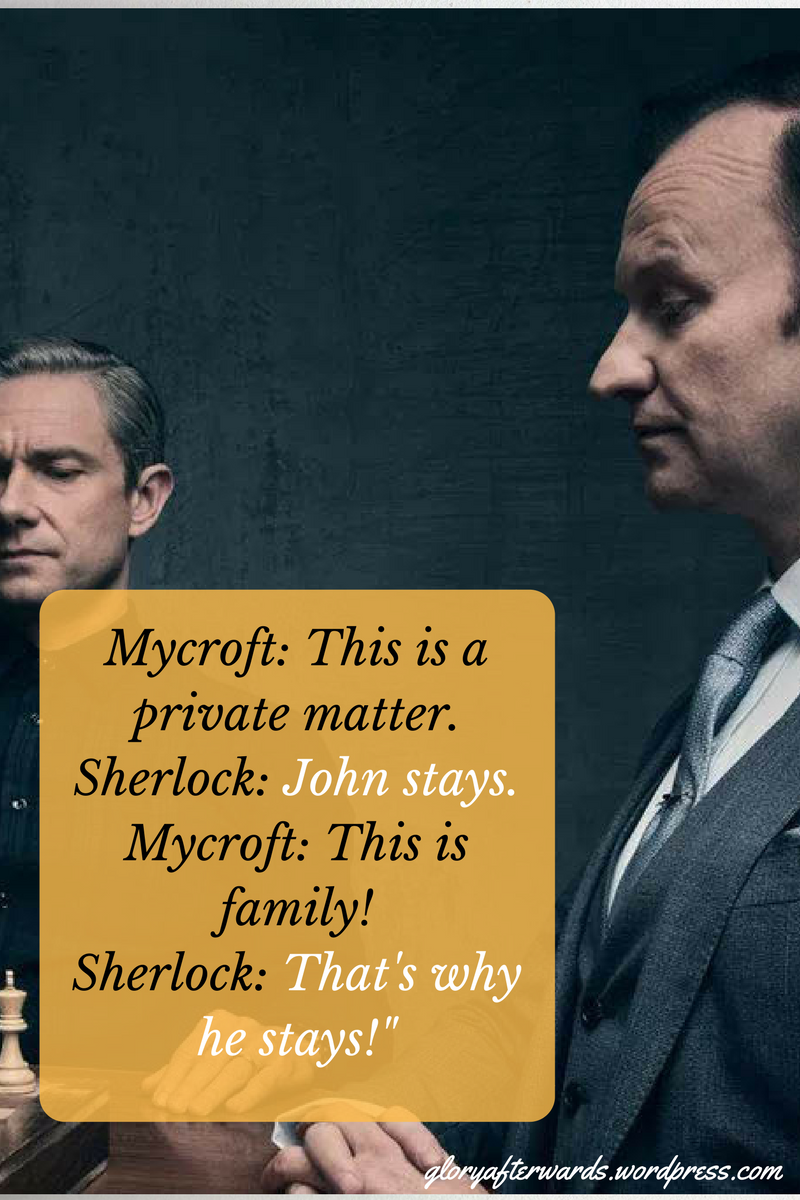



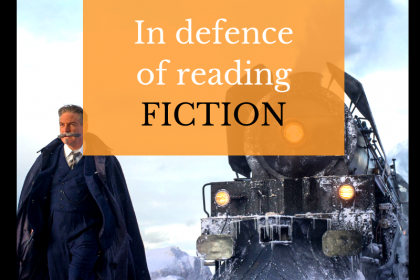




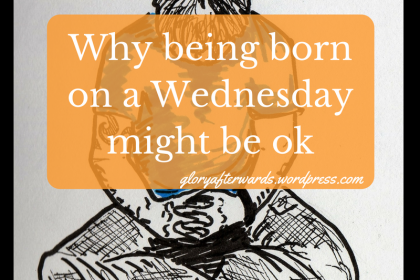
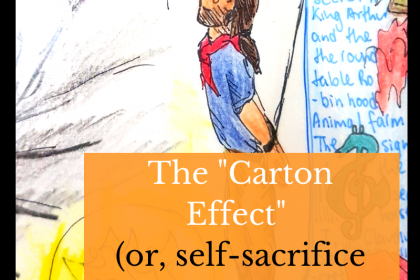
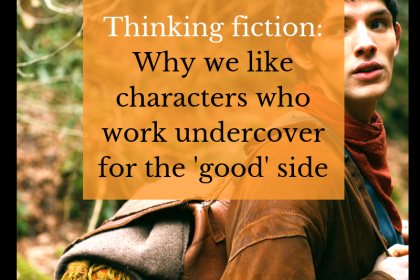
[…] and appropriate Doyle’s tales, it is Sherlock Holmes and John Watson who we take and place in the 21st century or WWII – and if we’re lucky some plot points survive the time […]
[…] Sherlock Holmes. […]